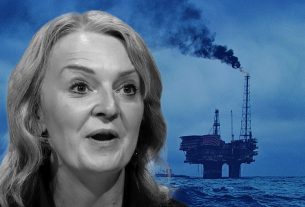A single day of questions at Westminster for the prime minister has provided a glimpse of the extent and range of immediate challenges and crises that Boris Johnson has been entrusted to lead the country through.
A double bill for Johnson began with PMQs and was followed by an appearance before the House of Commons Liaison Committee on Wednesday (January 13) in which he was questioned by his political peers on issues including Brexit, free school meals parcels, Covid-19, Brazil, ICUs, vaccines, the NHS and Donald Trump. And much more else besides.
Given the scope it’s perhaps surprising the day’s news agenda was shaped by a mum on social media, whose concerns about the amount of food her child had been provided were retweeted by a footballer.
RoadsideMum sets news agenda with photo FSM photo
The specific issue was sparked into life by @RoadsideMum tweeting a photo of a food parcel provided to feed her child for 10 days – made up of two potatoes, one loaf of sliced bread, one tin of beans, eight single cheese slices, two carrots, three apples, two snack pack malt loaf, three yoghurt tubes, one tomato and a measurement of dried penne pasta.
“Issued instead of £30 vouchers,” RoadsideMum tweeted. “I could do more with £30 to be honest.”
As she proved with her next tweet which gave the cost of the food if bought from Asda with the statement: “Public funds were charged £30. I’d have bought this for £5.22. The private company who have the #FSM [free school meals] contract made good profit here.”
The private company Chartwells replied to the tweet, thanking @RoadsideMum “for bringing this to our attention”, and adding: “this does not reflect the specification of one of our hampers. Please can you DM us the details of the school that your child attends and we will investigate immediately.”
However, RoadsideMum’s image had seized the morning’s news agenda so the PM was understandably prepped, primed and ready to “get to grips” with the story. There was only one possible response for a politician to give and predictably the prime minister seized it and described the food parcel as “disgraceful”. He even gave Marcus Rashford a call to let the footballer know the government was dealing with the matter. And he told Starmer in the Commons he should pay attention to Rashford’s ability to hold the government to account, unlike the Labour leader.
Starmer – who also retweeted the image while asking: @BorisJohnson, would you be happy for your kids to live on this? If not, why do you think others should? – rose to the challenge in the Commons and listed off the contents for a FSM parcel as detailed on the government’s own website and pointed out how similar, in fact, how almost exactly the same the two were.
But the nature of what PMQs has become meant Johnson didn’t answer Starmer’s question and instead had to withdraw his remark calling the Labour leader a “hypocrite”, when the Speaker intervened.
‘A scandal and a disgrace’
The PM said at PMQs the company involved had “rightly apologised and agreed to reimburse” the schools involved, and later at the Liaison Committee he said they “have been hauled over the coals and asked to explain how this happened.”
Having failed to adequately deal with Starmer’s point in the Commons, the PM took his chance now and said: “I should stress that the images did not reflect the actual Government guidance which is for about double the quantity of food for lunch packs for five days that you have seen, if not more.”
Johnson said: “It is a scandal and a disgrace that some companies are trying to get away with the provision that they’re offering. Clearly the packages that were on offer were totally, woefully inadequate and that’s why we’ve taken the steps that we have.”
Brexit ‘teething problems’
“Totally, woefully inadequate” could sum up the “steps taken” by the government to help business prepare for the Brexit deal it struck with the EU just a week before the end of the transition period.
Especially Northern Ireland businesses relying on goods from Britain, as Jeffrey Donaldson, the DUP’s leader in the House of Commons remarked during PMQs. The deal has resulted in empty shelves in shops and a warning from the UK’s biggest supermarkets of “significant disruption to food supply” to Northern Ireland because of “unworkable post-Brexit border arrangements”. Donaldson wanted to know if the PM will invoke Article 16 of the Brexit deal which allows for the UK government to raise the problems of GB-NI trade with the EU for further discussion.
The PM’s answer suggested he might, but he probably wouldn’t because while acknowledging the “teething problems” at the start of the Brexit process, Johnson insisted “goods are flowing effectively” from GB into NI.
Despite the clear, indisputable evidence of empty shelves and the testimony from people and businesses in Northern Ireland who have been affected because Northern Ireland is still in the EU’s single market for goods. This requires paperwork and has made it more difficult to ship goods from GB to NI – despite all the pre-Brexit assurances made by Johnson and his government to the contrary.
To ban or not to ban? Is Brazil the PM’s question?
But such and any assurances have proved to count for little during the first 13 months of Johnson’s administration given how defined iby U-turns it has become. So when the former health secretary Jeremy Hunt asked Johnson about the emergence of a new variant of Covid-19 in Brazil and whether flights from there to the UK should be banned, how many truly expected a definitive answer?
Brazil banned flights from the UK on Christmas Day and the PM expressed “concern” at the new variant but assured MPs: “we already have tough measures” to protect the country from infections from abroad. He added: “There are lots of questions we still have about that variant, we don’t know for instance, any more than we know whether the South African variant is vaccine resistant.”
Yvette Cooper’s questions were about the specific measures taken to protect the UK from the new Brazillian variant, though the prime minister gave a typically obfuscating reply.
Cooper, the chair of the Home Affairs Committee, asked: “We were warned about the Brazil variant three days ago, we don’t know yet whether that will potentially undermine the vaccination programme so why aren’t you taking immediate action on a precautionary basis?”
“Well we are,” replied Johnson, “and we’re putting in extra measures to ensure that people coming from Brazil are checked and indeed stopping people coming from Brazil.”
“Are you?” asked Cooper, quizzing whether “that’s a new announcement?”
“No sorry,” said Johnson, dithering and apparently realising he had just made a new announcement about rules for travel from Brazil. “I said what we were looking at was the question of whether or not the Brazilian variant is immune resistant.”
Cooper asked if Brazil would be subject to a new travel ban and Johnson said “We are taking steps to ensure that we do not see the import of this new variant from Brazil.”
Cooper wanted to know what those steps “are exactly” and pressed the PM for clarification who eventually cited the need for pre-departure negative tests for people coming into the country, which come into force on Friday (January 15) – nine months and nearly 90,000 “official” deaths after the outbreak.
Schools reopening
From Brazil and the coronavirus the PM then faced questions about whether schools would reopen in February as planned; as is the “priority” said Johnson, who could commit only to being able to reopen them “as soon as possible”.
Like all things, schools reopening “depends on a number of things” not least the vaccine, or whether the new variants are resistant to it, said Johnson.
Very substantial risk ICUs will be overwhelmed, warns Johnson
The remark raises a scenario that no-one wants to have to consider, not least the health care workers fighting the virus on the frontline.
Johnson warned of the “very substantial” risk that intensive care units (ICUs) could be overwhelmed by Covid patients, telling MPs at the Liaison Committee hearing: “If you ask me, when do we think that the ICU capacity is likely to be overtopped? I can’t give you a prediction for that.
“But all I can say is that the risk is very substantial and we have to keep the pressure off the NHS and the only way to do that is to follow the current lockdown.”
The prime minister said, “the situation is very, very tough indeed in the NHS” and “the strain is colossal” on staff, physically and mentally – comments echoing those made by the BMA in the last week.
And then came questions on the NHS test and trace system, vaccines for minority ethnic communities, the number of Covid vaccines, the government’s social care plan, Donald Trump and other issues.
Record number of Covid deaths – total nears 90,000
And all this – and so much not mentioned, but not forgotten either- discussed on the same day the UK recorded its highest daily death toll since the outbreak of Covid-19 nine months ago, with 1,564 added to the official figures.
The previous highest daily toll was April 8 when 1,455 deaths were reported. Today’s addition takes the total to 84,767 deaths within 28 days of a positive test. Where Covid-19 is mentioned on the death certificate, the number is 89,243.
Press Association research suggests Britain may have already passed the 100,000 death mark, reports the Telegraph, adding Public Health England’s (PHE) finding that more people have died in the second wave of coronavirus than in the first.
“With each passing day, more and more people are tragically losing their lives to this terrible virus, and today we have reported the highest number of deaths on a single day since the pandemic began,” said Dr Yvonne Doyle, medical director at PHE.
Things may get tighter still
The vaccination programme is the country’s hope but Johnson will again be tested when the impact of the lockdowns is reflected in fewer cases, lower hospital admissions and dramatically reduced deaths.
Because then, like before, the clamour and pressure to lift restrictions as soon – and as fast – as possible will come from all angles despite warnings, as before, to move slowly.
How far the PM can withstand the inevitable pressure from his own backbenches – most obviously from the CRG (Covid Research Group) of Conservative MPs, and amplified by the multiple anti-lockdown commentators across the media – will determine the fate of England at least.
Johnson, if history is any guide, will once again make the populist choice in order to try win the favour of as many as possible no matter how short-term their support or how long-term the damage of his decisions. After all, he memorably said in September – not long after Chancellor Rishi Sunak’s ‘Eat out to help out’ campaign – that a second lockdown would be a disaster.
Two “disasters” later and England – like the other UK nations – is in the midst of its third lockdown with the PM warning things “may” get tighter still.




